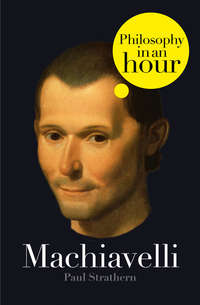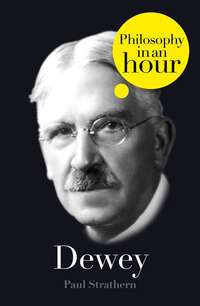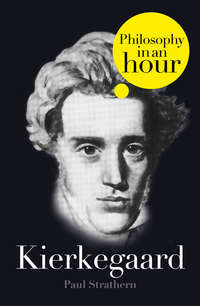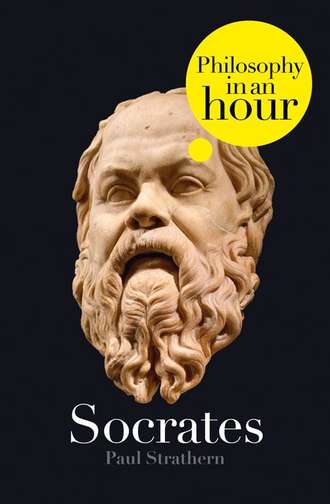
Полная версия
Socrates: Philosophy in an Hour

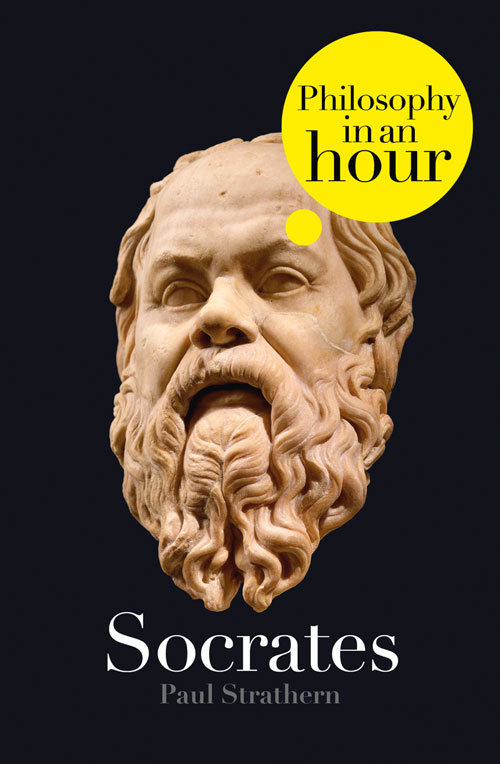
Socrates
PHILOSOPHY IN AN HOUR
Paul Strathern

Contents
Cover
Title Page
Introduction
Socrates’ Life and Works
Afterword
Further Information
Some Observations Attributed to Socrates
Chronology of Significant Philosophical Dates
Chronology of Socrates’ Life
Chronology of Socrates’ Era
Recommended Reading
About the Author
Copyright
About the Publisher
Introduction
In the beginning was the world, and we didn’t really know much about it. But we survived regardless. The original philosopher was the puzzled Neolithic who questioned this state of affairs. What on earth was going on? What was it all about?
For countless millennia the answers we came up with were not philosophy. They consisted of superstition, fairy tales, and religion. The first people to come up with philosophical answers – that is, those who used reason and observation unclouded by metaphysical mumbo jumbo – were the ancient Greeks, in the sixth century B.C. Precisely why this major step in human evolution should have taken place at this time on the obscure shores of the Aegean remains a mystery. The Chinese, the Babylonians, and the ancient Egyptians were all more advanced at this stage, their civilizations more powerful and extensive. They also had superior practical technology and knew far more about mathematics. The intricacies of silk manufacture, pyramid building, and the ability to predict eclipses were well beyond Greek capacities. And compared with the theological sophistications of the Chinese, Babylonian, and ancient Egyptian religions, the ancient Greeks’ collection of primitive myths about the behaviour of the gods on Olympus was laughable. This was religion retarded in its infantile stage of development (only when it matures does religion require human sacrifice).
But this childish state of affairs may well hold the key to the mystery, at least in part. Without it, the miraculous flowering of ancient Greek culture – which is still recognisable as the foundation of Western culture – may never have occurred. The trivial religion of the Greeks had no place for theological or intellectual speculation. Before the Greeks, intellectual inquiry had always been related to religion – allowing metaphysics and superstition to infiltrate the processes of reason and observation. Babylonian astronomy was plagued by astrology; Egyptian mathematics was permeated with religious superstition. When the ancient Greeks began to ask intellectual questions, they were unencumbered by such ballast. Their thoughts soared free in a real world.
Perhaps as a result of this freedom, the development of ancient Greek culture took place at truly miraculous speed. For example, Greek tragedy developed from stilted and primitive religious ritual to sophisticated drama (formally little altered to this day) in the course of a single generation. Likewise, philosophy began midway through the sixth century B.C., but by the end of the following century it had produced Plato, whom many still regard as its most masterly exponent. The advances in ancient Greece during the fifth century B.C. remain qualitatively unrivalled to this day. And only the twentieth century exceeds it in quantitative change.
The first philosopher is generally recognised as Thales of Miletus, an ancient Greek from Asia Minor. We know he was practicing his profession in 585 B.C. because he achieved fame by predicting an eclipse of the sun which occurred in that year. (This knowledge he almost certainly cribbed from Babylonian sources.) Thales is regarded as the first real philosopher because he was the first to attempt an explanation of the world in terms of its observable nature rather than by mythology. This meant that his conclusions could be subjected to rational argument about whether they were right or wrong. The main thesis of Thales’s philosophy was that everything was ultimately made up of water. He thus set the tone for all future philosophy by getting it wrong.
After Thales, philosophy rapidly began to flourish. More philosophers appeared, with a succession of different explanations of the world. It wasn’t made of water, it was made of fire – then air, then pieces of light, and so on. The philosophers who belong to this period (mid-sixth to mid-fifth century B.C.) are generally known as the pre-Socratics. For the most part only fragments of their philosophy remain – either in directly written form or in references from other sources. Despite this, many of their names are still familiar. Pythagoras – famous for the mathematical theorem he did not in fact discover himself – discerned the role played by numbers in music. (Harmony depends upon numerical ratios.) This led him to believe that the world is ultimately made up of numbers. Such a theory is not quite as daft as it may at first appear. Einstein, for instance, certainly believed that the universe could be explained in terms of mathematics. Modern scientists may not believe that the world is made up of numbers, but from quarks to quasars numbers play a central role in description and definition. Another pre-Socratic philosopher who anticipated modern science was Democritus, who believed the world was made up of atoms. (It was to be more than two thousand years before scientists came round to this point of view.)
Anaxagoras was the first Athenian philosopher – though it’s almost certain he was originally an import, shipped in from Ionia (Asia Minor) by Pericles to raise the tone of Athenian education. Anaxagoras was very much a minor philosopher. He reversed the trend of explaining the world in terms of a single substance, claiming rather that it consisted of an infinite number of substances. Indeed, everything contained a bit of everything else. As a result of this mélange he was forced to argue that even plants had a mind of their own, that snow was partly black, and that water contained elements of dryness. Despite these anomalies masquerading as ideas, Anaxagoras is important. It was he who introduced philosophy to Athens, and he was also the man who introduced philosophy to Socrates. Anaxagoras was Socrates’ teacher.
According to one source, Anaxagoras also taught Pericles, who went on to become the driving political force behind Athens’s golden era (mid-440s B.C. to the end of the 430s B.C.). This period saw the construction of the Parthenon, the great era of Greek tragedy, the sculpture of Phidias (whose Zeus became one of the Seven Wonders of the Ancient World), and the emergence of classical philosophy with Socrates. What part (if any) Anaxagoras had in influencing Pericles is not known. What is known is that Anaxagoras claimed the sun was a huge super-hot rock and the moon was made of earth. For expressing such ideas (ironically his only ones that came close to the truth) Anaxagoras was prosecuted for impiety and forced to flee Athens for his life. This is the first real evidence of philosophy being taken seriously. It was dangerous.
Anaxagoras first demonstrated these lessons to Socrates – that philosophy was both serious and dangerous. As we shall see, Socrates chose to ignore them. Ignoring the first lesson made him one of the most engaging of all philosophers. Ignoring the second was to cost him his life.
Just a century after it had begun, philosophy entered its greatest age. This was to include three of the finest philosophers the world has seen. The first of these was the idiosyncratic Socrates, who spent so much of his time talking about philosophy on the streets of Athens that he never actually got around to writing anything down. This means that we know of Socrates’ teaching only through the writings of his famous pupil Plato, and it’s often difficult in these writings to determine which ideas are Plato’s and which are those of his mentor.
Socrates developed a method of negatively aggressive questioning called dialectic (the forerunner of logic). This he used in conversation to cut through the twaddle of his adversaries and arrive at the truth. Plato captured the spirit of these conversations in his classic dialogues. Plato’s more orthodox approach and way of life were to bring a much-needed element of respectability to philosophy. But he persisted in the philosophic tradition of getting it wrong. Plato believed that the real world was made up of ideas, and that the world we see and experience consists of no more than shadows. Despite this unrealistic attitude, many thinkers believe that all of philosophy since has been little more than footnotes to Plato’s writing. Although this is an exaggeration, it’s certainly true that Plato was the first to formulate clearly many of the basic philisophical problems that exercise us to this day.
The third member of this triumvirate was Aristotle, who was one of Plato’s pupils. The scholarly Aristotle firmly rejected his master’s attempt to make philosophy interesting by presenting it in the form of dialogues. Instead he wrote scores of treatises, many of which were mislaid by his ungrateful followers. Aristotle’s rules of thought and classification laid the foundations for most philosophical and scientific thought during the next two millennia. Only in recent centuries have we begun to appreciate how Aristotle got it wrong. He appears to have understood that all comprehensive explanations were bound in the end to be wrong – but this didn’t stop him from trying for one.
Without philosophy, which began in ancient Greece and for centuries retained its distinctive Greek character, we would not be what we are today. We would have no science, and the attempt to arrive at truth of any sort would remain largely a matter of fantasy and whim – just as it remains in the so-called sciences of politics, psychology, and economics, for instance. Even ethics continues to languish in this sad state, despite the persistent attentions of philosophers and theologians through the ages. Nowadays we are not only no better, morally speaking, than we were more than two thousand years ago, but we don’t even know how to be.
It has taken philosophers twenty-five centuries of getting it wrong to conclude that getting it wrong isn’t the point. Now they believe that the mere practice of philosophy is what matters. Thus philosophy has become an activity, like wine-tasting or tax evasion, with similarly ambiguous effects on the practitioner. For the first time in the history of philosophy, the attempt by any individual to construct a philosophy as such (that is, one of his own) has become redundant. The tradition of Plato, Kant, Ehrensvard, and Wittgenstein has come to an end. This tradition of reason and observation, which attracted some of the finest minds the world has known, first grew to maturity with Socrates.
Socrates’ Life and Works
Socrates was born in 469 B.C. in a village on the slopes of Mount Lycabettus, which was then a twenty-minute walk from Athens. His father was a sculptor and his mother a midwife. Initially the young Socrates was apprenticed to his father; according to one tradition, he worked on The Three Muses in Their Habits which adorned the Acropolis. He was then sent to study with Anaxagoras.
Socrates went on to study under the philosopher Archelaus, “by whom he was beloved in the worst sense,” according to Diogenes Laertius, the third-century A.D. biographer. In ancient Greece, as still in much of the eastern Mediterranean, homosexuality was regarded as a quite acceptable diversion. Not until the advent of Christianity was a limited heterodox approach to replace such orthodox sexual practice. So while Anaxagoras was forced to flee Athens in fear of his life for teaching his pupils that the sun was a radiant star, Archelaus remained free to indulge in more than intellectual intercourse with his pupils.
With Archelaus, Socrates studied mathematics and astronomy as well as the teachings of earlier philosophers. Philosophy had been pursued for just over a century and was very much the nuclear physics of the age. Indeed, the world of philosophy (which consisted entirely of water, then fire, then points of light, and so on) bore as much relation to the real world as the world of modern nuclear physics bears to our own everyday reality. We scarcely regard our encounters with mesons as the highlight of our daily existence, and one suspects that the ancient Greeks had a similarly blasé attitude toward the latest revelation that their world was in fact a goldfish bowl, a furnace, or a fireworks display.
Socrates soon decided that these speculations about the nature of the world were of no possible benefit to humanity. For an ostensibly reasonable thinker, Socrates was curiously antiscientific. Here he was almost certainly influenced by one of the greatest pre-Socratic philosophers, Parmenides of Elea. During his youth Socrates is said to have met the aging Parmenides and “learned much from him.” Parmenides resolved the conflict between those who believed the world was made up of a single substance (such as water or fire) and those like Anaxagoras who believed it consisted of a great many substances. He overcame this conflict by the simple method of ignoring it. According to Parmenides, the world as we know it is merely an illusion. It doesn’t matter how many things we think it is made of, because it doesn’t exist. The only true reality consists of eternal Being, which is infinite, unchanging, and indivisible. For this Being there is no past and no future: it subsumes the entire universe and everything that can possibly happen in it. “All is one” was Parmenides’ basic principle. The ever-changing multiplicity we observe is merely the appearance of this static, all-embracing Being. Such an attitude to the world is scarcely favourable to science. Why bother with the workings of the world when they are nothing but an illusion?
In these early days philosophy was considered the study of all knowledge. (In Greek, philosopher means “lover of wisdom.”) Mathematics, science, and cosmology did not exist as such; for centuries they were considered part of philosophy. As late as the seventeenth century Newton called his masterpiece on gravity and the workings of the universe Philosophicae Naturalis Principia Mathematica (The Mathematical Principles of Natural Philosophy). Only through the years did philosophy come to be regarded by many as the study of metaphysical – and thus unanswerable – questions. Whenever philosophy actually found the answers to questions, it ceased to be philosophy and became something else – a separate subject such as mathematics or physics. The most recent example of this is usually considered to be psychiatry, which claimed to answer a number of questions and immediately set up shop as a separate science. (In fact it does not fulfill the philosophic requirements of a science, which demand a set of principles that can be tested by experiment – requirements not fulfilled by the inexactitudes of paranoia, psychoanalytic cures for dementia, and other forms of psychopathic disorder.)
In Socrates’ time this entire field was of course considered part of philosophy (and philosophers were popularly regarded by the citizens of Athens much as the public today regards psychiatrists). Socrates’ attitude toward philosophy was certainly psychological in the original sense of the word. (In Greek, psychology means “the study of the mind.”) But he was no scientist. The influence of Parmenides saw to that. Reality was an illusion. This had a negative effect on Socrates and his successor Plato. During their lifetimes a few significant advances were made in mathematics, but only because this was considered timeless and abstract, and thus thought to be in some way connected with the ultimate reality of Being. Fortunately their successor Aristotle had a different attitude toward the world. He became in many ways the founder of science, and drew philosophy back toward reality. But the unscientific – indeed, antiscientific – attitude that developed with Socrates was to cast a blight on philosophy for centuries to come.
Largely as a result of Socrates’ antiscientific attitude, the few great scientific minds of the ancient Greek world worked outside philosophy. Archimedes (in physics), Hippocrates (in medicine), and to a certain extent Euclid (in geometry) were isolated from philosophy and thus from any developing tradition of knowledge and argument. Ancient Greek scientists knew the earth went around the sun, knew it was round, and even calculated its circumference. They observed electricity and were aware that the earth had a magnetic field. Outside the “universal wisdom” of philosophy, such factual bits of knowledge were isolated to the status of oddities. We owe a great deal to Socrates for placing philosophy on the sound basis of reason. But the fact that philosophy came of age under the aegis of an antiscientist must count as one of the great misfortunes of human learning. It is difficult to overemphasise the significance of this missed opportunity. The mental energy expended in the Middle Ages calculating the number of angels who could stand on the head of a pin might instead have been dealing with the atoms first posited by Democritus.
Конец ознакомительного фрагмента.
Текст предоставлен ООО «ЛитРес».
Прочитайте эту книгу целиком, купив полную легальную версию на ЛитРес.
Безопасно оплатить книгу можно банковской картой Visa, MasterCard, Maestro, со счета мобильного телефона, с платежного терминала, в салоне МТС или Связной, через PayPal, WebMoney, Яндекс.Деньги, QIWI Кошелек, бонусными картами или другим удобным Вам способом.


